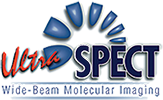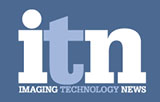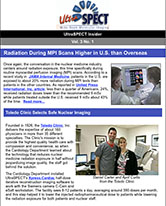 Radiation During MPI Scans Higher in U.S. than Overseas
Radiation During MPI Scans Higher in U.S. than Overseas
Once again, the conversation in the nuclear medicine industry centers around radiation exposure, this time specifically during routine myocardial perfusion imaging (MPI) scans. According to a recent study in JAMA Internal Medicine, patients in the U.S. are exposed to about 20% more radiation during MPI tests than patients in the other countries. As reported in the United Press International, Inc. article, less than a quarter of Americans, 24%, received radiation doses lower than the recommended 9 mSv while patients treated outside the U.S. received 9 mSv about 43% of the time.
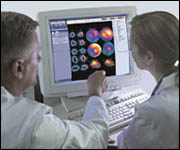 Nuclear cardiac imaging plays a key role in diagnosing and managing coronary artery diseases, and it is vital to deliver it in the safest way possible to maintain its tremendous contribution for patient care. The call for practitioners is to redouble the efforts to implement the fundamental principles of radiological protection: Justification and Optimization as set forth by the International Commission on Radiological Protection (ICRP):
Nuclear cardiac imaging plays a key role in diagnosing and managing coronary artery diseases, and it is vital to deliver it in the safest way possible to maintain its tremendous contribution for patient care. The call for practitioners is to redouble the efforts to implement the fundamental principles of radiological protection: Justification and Optimization as set forth by the International Commission on Radiological Protection (ICRP):
- Justification, in practice, entails making sure each and every MPI exam performed is the right test for the right patient at the right time.
- Optimization, encompassing the principle of ALARA (As Low As Reasonably Achievable), ensures that we obtain good quality diagnostic information while minimizing radiation dose. In fact, there are several dose-reduction approaches mentioned by Andrew Einstein (2013), one of which is iterative reconstruction software with resolution recovery and noise reduction, such as one from UltraSPECT. Safety-oriented technology allows facilities to offer safer nuclear imaging scans.
Toledo Clinic Selects Safe Nuclear Imaging
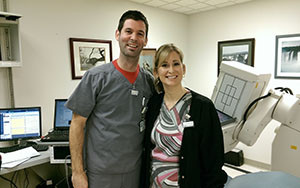
Daniel Carter and April Curtis from the Toledo Clinic. Focus on patient, staff safety leads Toledo Clinic Cardiology Department to implement dose-reduction WBR technology.
Founded in 1926, the Toledo Clinic, Inc. delivers the expertise of about 160 physicians in more than 35 different specialties. The Clinic’s mission is to provide the highest quality health care with compassion and convenience, so when the Cardiology Department learned about the technology that reduces nuclear medicine radiation exposure in half without jeopardizing image quality, the staff got behind the solution.
The Cardiology Department installed UltraSPECT’s Xpress.Cardiac half-dose iterative reconstruction imaging software to work with the Siemens camera C-Cam and eSoft workstation. The facility sees 8-12 patients a day, averaging around 390 doses per month, and this step helped it to lower the injected radiopharmaceutical dose to patients while lowering the radiation exposure for both patients and nuclear staff.
The Toledo Clinic installed UltraSPECT as part of HeartLight Pharmacy Services’ HeartSafe Imaging™ program, which helps facilities reduce SPECT radiation exposure and minimize scan time for patient comfort. Nuclear medicine imaging facilities can receive UltraSPECT products as part of their radiopharmaceutical supply agreement with HeartLight Pharmacy Services.
“When we pondered UltraSPECT’s capabilities, it made logical sense to go with the technology,” said Daniel Carter, B.S., CNMT, NCT, technologist at the Toledo Clinic. “Everything is moving toward reducing radiation exposure, from Image Gently and Image Wisely campaigns to the American College of Radiology (ACR) regulations. With UltraSPECT, we can use a half-dose protocol to get very good resolution images, comparable or even better to what we had before, with edges more defined. If we need to use a full dose, then we can cut the scan time in half.”
The Cardiology Department set a lighter patient schedule for one day to accommodate training and make the workflow transition smooth. Scott Truman, Sales and Application Specialist with UltraSPECT, was onsite to meet with the staff and train them on using the new technology. Together with the comfortable camera the department uses, the UltraSPECT software helps patients receive a safer test while technologists get the best quality study.
“The technologists and physicians at the Toledo Clinic were very patient-friendly and I loved their system so much, I sent my own parents to the site for their first-ever stress tests,” said Truman. “The staff made them very comfortable and relaxed. I had every confidence they would take great care of my family.”
UltraSPECT in the News
The Heart Center at Firelands Regional Medical Center, Sandusky, Ohio, is reducing radiation exposure for patients and staff with low-dose image processing technology from UltraSPECT, which also marks the 450th installation in the USA for the company.
Read the full story on Imaging Technology News.
